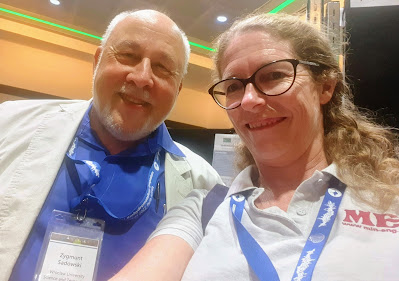People often ask why flotation, which has been around for more than a century, is still so intensively researched. A major reason is that it is crucial to the economic production of many critical metals and minerals, and handles vast tonnages, so even modest increases in recoveries have a marked effect on overall production, which is why flotation has always been MEI's most important conference series.
Flotation '23, which will be held next November in Cape Town, has already attracted major corporate sponsors, and the latest to join us is Clariant, one of the world’s leading specialty chemical companies, providing a wide range of flotation collectors for specific duties such as the flotation of industrial minerals, iron ore, and molybdenite.
 |
| Current Flotation '23 sponsors |
Due to difficulties with storage, handling and disposal of xanthate collectors, sulfide mining companies are facing increasingly difficult xanthate logistics challenges. Through collaboration with customers, Clariant has developed alternatives with high copper flotation performance and safer handling and disposal solution for mines, lowering capital expenditure and providing a longer shelf life than solid xanthate. The Clariant xanthate replacement collectors allow operators to discontinue the use of sodium isopropyl xanthate and potassium amyl xanthate.
Having the support of a major company such as Clariant, which employs over 13,000 people worldwide, is good news, as is news of one of our other sponsors, Metcelerate Limited, whose training solution builds technical competence in the mineral processing workplace for metallurgists and engineers. Metcelerate recently won the annual IChemE 2022 Global Award for Business Start-Up companies. Prof. Jan Cilliers, CFO of Metcelerate, said “We are very proud and humbled to have been acknowledged in this way by an esteemed organisation such as IChemE. We started Metcelerate to assist mining companies to close the skills gap in mineral processing, one of the most important elements of mining profitability. Our experience, backed by published data, tells us that this is a serious gap for mining companies. Graduates from our program have skills and ability to produce better results, and this is supported by feedback from learners and their supervisors.”
 |
| Jan Cilliers with the IChemE award |
Metcelerate is delivered by a team of global academic experts and practitioners, and is now into its third intake of learners, with a fourth intake scheduled for mid-2023. To date it has trained learners across four continents. The 20-month program consists of a mixture of online course material, live tutorials and practical in-plant exercises. Learning is built around the real problems mineral process engineers face daily. The Metcelerate course is especially valuable for high-performing chemical, mechanical and other engineers transferring into the minerals industry. “This award will inspire us to work even harder to make the Metcelerate Course the industry standard” says the CEO, Diana Drinkwater, who will be at Flotation '23 next year to deliver a keynote lecture on management of the "People Asset".

.jpg)









.jpg)
.jpg)














.jpg)
.jpg)


















